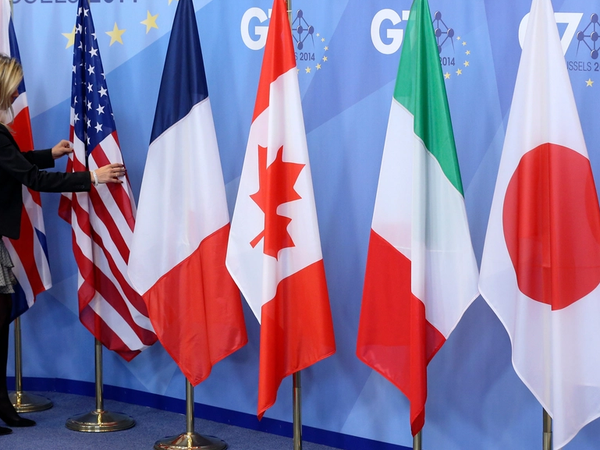The G7 foreign ministers and the EU High Representative have condemned Iran's export of ballistic missiles to Russia, calling it an escalation in Tehran’s support for Moscow's war against Ukraine.
The G7 statement, seen as a rebuke to Tehran's growing military ties to Moscow, highlighted that despite international warnings, Iran has continued to arm Russia, directly contributing to the death and destruction in Ukraine.
The ministers stressed the critical role Iranian-made drones and missiles have played in Russia's indiscriminate attacks on Ukrainian civilians and infrastructure.
According to the G7, "Iran must immediately cease all support to Russia's illegal and unjustifiable war against Ukraine and halt such transfers of ballistic missiles, UAVs, and related technology." The statement emphasized that these actions pose a direct threat not only to Ukraine but to European and international security as well.
The G7 vowed to hold Iran accountable for its deepening role in the war, noting that further punitive measures were already in motion. This comes as part of a broader effort to curb Iran’s escalating involvement in aiding Russia, a partnership that the G7 sees as undermining global stability and international law.
Iran downplays sanctions but stresses dialogue
In recent weeks, European nations have moved quickly to counter Iran’s military assistance to Russia. The European Troika—comprising the UK, France, and Germany—released a joint statement condemning the transfer of Iranian ballistic missiles to Russia. They have since imposed sanctions on Iran’s aerospace industries and are signaling their intent to suspend all air services to the country.
Iran’s Foreign Minister, Abbas Araghchi, dismissed the latest sanctions imposed by the US, UK, and the European Union on Iran, signaling Tehran's defiance in the face of Western pressure. “Tehran will continue its path with strength,” he said, framing the sanctions as futile attempts to halt Iran’s military cooperation with Russia. However, Araghchi also emphasized that Iran remains open to dialogue, though he stressed that negotiations must be based on "mutual respect, not on threats and pressure." He denounced sanctions as tools of "pressure and confrontation, not cooperation."
The UK has targeted seven individuals and entities linked to Iran’s aerospace sector, while the US has gone a step further by sanctioning Iran Air for facilitating the transfer of these missiles. European nations have followed suit, with several moving to cancel bilateral air service agreements with other Iranian airlines.
West united in condemning missile deliveries
The US Treasury Department confirmed earlier this month that Russia received its first shipment of short-range ballistic missiles from Iran. Satellite images published by European media revealed a Russian cargo ship, "Port Olya 3," transporting the missiles across the Caspian Sea. Maxar Technologies, an intelligence company, captured the ship docked at an Iranian port before it vanished from radar. Ukrainian sources reported that the shipment contained approximately 220 Fateh-360 short-range ballistic missiles, weapons that could be deployed in Russia’s ongoing war against Ukraine.
Despite overwhelming evidence, Iran’s state airline, Iran Air, has denied any involvement in the military transfers. In a statement to Dideban Iran, Abolfazl Zohrevand, a member of Iran’s National Security and Foreign Policy Committee of Parliament accused Western nations of “fabricating allegations” as part of a broader campaign to undermine Iran’s sovereignty.
“These countries recently sanctioned Iran Air despite the airline having no involvement in military matters,” Zohrevand stated, calling the sanctions a form of "unacceptable interference in Iran’s domestic policies." He argued that the West, particularly the US and Europe, was using Iran as a scapegoat to deflect attention from their own failures in Ukraine.
Tehran looking for easy ways to reduce sanctions
Meanwhile, reports from The Washington Post indicate that President Masoud Pezeshkian's administration is signaling a cautious interest in re-engaging with the West, potentially in pursuit of sanctions relief. However, with Iran embroiled in the Hamas and Hezbollah conflict with Israel and the lack of a new nuclear deal, the prospect of a diplomatic breakthrough seems more remote than ever.
Despite the country’s deepening crises, Pezeshkian has appointed key figures like Abbas Araghchi and former foreign minister Mohammad Javad Zarif, both of whom were instrumental in negotiating the 2015 nuclear deal. However, Supreme Leader Ali Khamenei’s skepticism toward Western engagement casts doubt on the likelihood of any significant diplomatic shift.
As Iran walks a tightrope between its military alignment with Russia and its economic needs, it finds itself increasingly isolated and under mounting international pressure.
